After more than two years of real estate crisis, China has applied many measures, from lowering interest rates, loosening home purchase regulations to encouraging investment.
On November 8, Reuters quoted a source close to the matter as saying that Chinese authorities have asked insurance giant Ping An Insurance Group to buy a controlling stake in Country Garden, China's largest private real estate company, which is mired in trouble. According to this source, the Chinese government has instructed the Guangdong provincial government - where both companies are headquartered - to act as an intermediary to help Ping An rescue Country Garden.
Ping An was chosen because it is a major shareholder of Country Garden. Chinese authorities want Country Garden's liquidity problems resolved within the province.
Country Garden had 1.4 trillion yuan ($190 billion) in debt as of the end of June. It currently has about 3,000 projects under construction in China. Country Garden has been in trouble for the past few months, constantly on the verge of default.
It is not unprecedented for authorities to direct one company to take over another. But if it happens, it would be one of the most aggressive interventions yet by China to rescue its debt-ridden and illiquid property sector.
While other Chinese developers, including China Evergrande, have defaulted, the country’s policies so far have focused largely on lowering lending rates and easing home-buying rules. The Ping An news signals the Chinese government’s willingness to play a larger role in that process.
Earlier this week, China Vanke's top shareholder, state-owned Shenzhen Metro, also announced it had prepared about 10 billion yuan ($1.4 billion) to support China's second-largest real estate firm.
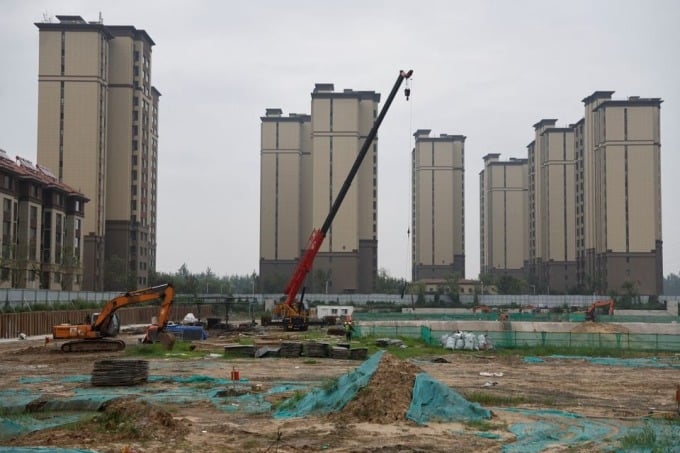
A Country Garden project in Tianjin (China) in August 2023. Photo: Reuters
China's real estate market has been in crisis since mid-2021. At that time, a series of businesses, from large private companies such as China Evergrande Group to government-backed companies such as CIFI Holdings, were facing difficulties in cash flow and debt repayment.
The cause is believed to be Beijing's "three red lines" policy, which was launched to reduce systemic risk by limiting the ability of real estate companies to borrow new money. This is considered the main reason why many real estate companies in this country defaulted on their debts. In the past two years, about 50 companies have defaulted on foreign bonds, with a scale of 100 billion USD, according to JPMorgan. Enterprises that have escaped bankruptcy are always in a precarious situation and have difficulty borrowing new capital.
By the middle of last year, the situation had worsened. Home prices in China continued to plummet. Many projects were stalled due to lack of funding. A wave of mortgage defaults erupted everywhere. China’s tough anti-Covid-19 campaign further dented market confidence.
Real estate now accounts for 25% of China's GDP. The sector's troubles are therefore fueling fears of a broader financial crisis.
Beijing has therefore had to change its policies and find ways to revive the industry. In March 2022, the Chinese government stopped its pilot program to impose a real estate tax. They have also repeatedly urged financial institutions to support the industry.
In November last year, Beijing rolled out a 16-point plan to rescue the property market, which was released by the People's Bank of China (PBOC) and the China Banking and Insurance Regulatory Commission (CBIRC) in mid-month. The plan provides guidance to financial authorities across the country, focusing on addressing the liquidity crisis of enterprises and will temporarily loosen restrictions on bank lending.
This marked a comprehensive effort by China to rescue the market, which former Governor Yi Gang had hoped would be a "soft landing". A few weeks later, a series of Chinese banks announced that they would pump hundreds of billions of dollars into real estate, which was considered an initial success of the plan.
Specifically, six major Chinese state-owned banks plan to inject $140 billion into the market. The capital will be mainly used for real estate development, mortgages for customers, mergers and acquisitions, supply chain financing and bond investments.
The PBOC began cutting lending rates across the board in mid-year. It also extended some of the 16-point rescue package's policies until the end of 2024.
The Chinese government has also approved plans to build affordable housing and renovate underdeveloped areas in major cities to boost investment in the real estate sector. It has also loosened some regulations, such as reducing loan interest rates for first-time buyers and reducing down payments for home purchases in some cities.
Banks have also come up with unprecedented ways to encourage home loans. Earlier this year, some banks in Nanning, Hangzhou, Ningbo and Beijing raised the age limit for home loans to 80-95 years old. This means that 70-year-olds can borrow for 10-25 years. This is a stimulus tool because it can reduce the burden of monthly repayments.
Local governments have also joined the rescue effort. In June 2022, Meishan, a city in Sichuan, said it would subsidize new home purchases this year. Wenzhou, a city in Zhejiang, will allow first-time homebuyers to pay only interest for the first three years. Huainan, a city in Anhui, has asked banks to increase lending and reduce loan approval times for first-time homebuyers.
Real estate companies themselves have also offered incentives to attract customers. In June 2022, Central China Real Estate accepted payments in wheat, providing farmers with up to 160,000 yuan ($24,000) in subsidies to offset down payments for homes in its River Mansion apartment project in Shangqiu, Henan . A few weeks earlier, it also offered to accept payments in garlic from buyers looking to buy homes in another project in the city of Kaifeng.
In Wuhu, Anhui, instead of sticking to the government-set floor price, Golden Scale House, an apartment project on the city's outskirts, offered repair subsidies of up to 230,000 yuan within a month of the transaction being completed.
However, the Chinese real estate market is not considered to have improved much. Figures released last month showed that new home prices in China had fallen for three consecutive months, up to the end of September.
Property sales (by floor area) in September also fell nearly 20% year-on-year. Property investment fell 9.1% in the first nine months of the year.
Homebuyers are holding off because they want prices to fall further. This is making the situation worse, because real estate companies need to sell more homes to raise cash and avoid bankruptcy.
Earlier this week, the International Monetary Fund (IMF) raised its growth forecast for China to 5.4% this year. However, the agency warned that China's economy still faces many risks in the financial and real estate sectors. They said the country's real estate sector is currently "quite weak".
The IMF has called on China to let unviable property firms exit the market, saying China’s allowing weak firms to continue operating has stunted the recovery of the sector.
At a financial forum in Hong Kong earlier this week, PBOC Deputy Governor Zhang Qingsong also acknowledged that the real estate sector is in decline.
"We need to control this speed more closely, to avoid a sharp decline and causing unexpected consequences. We have introduced many policies to stabilize the real estate market." He also called on authorities to find new ways to maintain economic growth, because "the old model based on investment and real estate is no longer sustainable."
Ha Thu (according to Reuters, NYT)
Source link





![[Photo] President of the Cuban National Assembly visits President Ho Chi Minh's Mausoleum](https://vphoto.vietnam.vn/thumb/1200x675/vietnam/resource/IMAGE/2025/10/1/39f1142310fc4dae9e3de4fcc9ac2ed0)
![[Photo] Keep your warehouse safe in all situations](https://vphoto.vietnam.vn/thumb/1200x675/vietnam/resource/IMAGE/2025/10/1/3eb4eceafe68497989865e7faa4e4d0e)
![[Photo] Hanoi morning of October 1: Prolonged flooding, people wade to work](https://vphoto.vietnam.vn/thumb/1200x675/vietnam/resource/IMAGE/2025/10/1/189be28938e3493fa26b2938efa2059e)


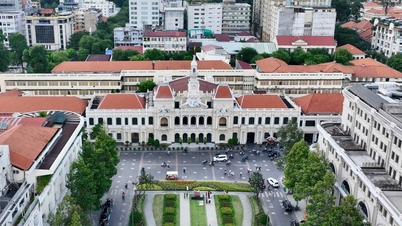







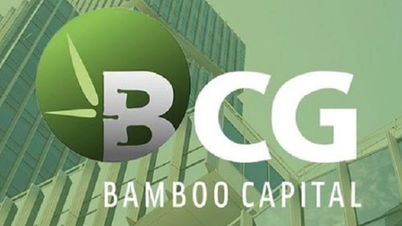

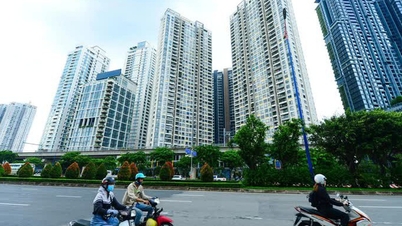






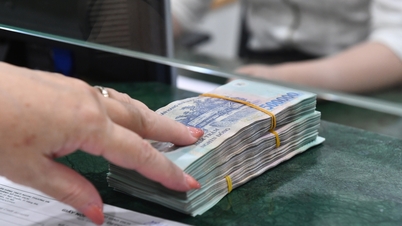









































































Comment (0)